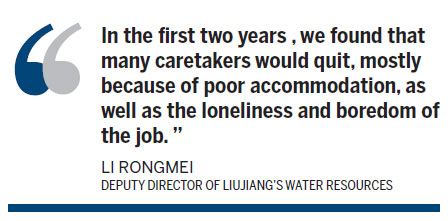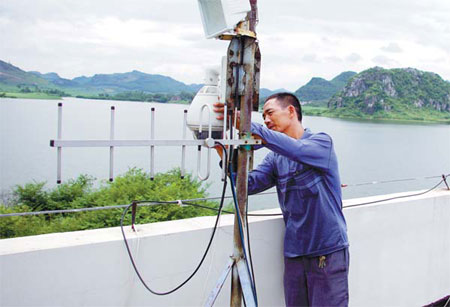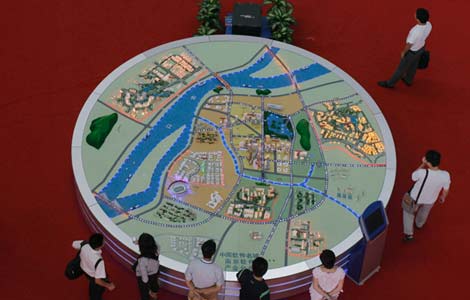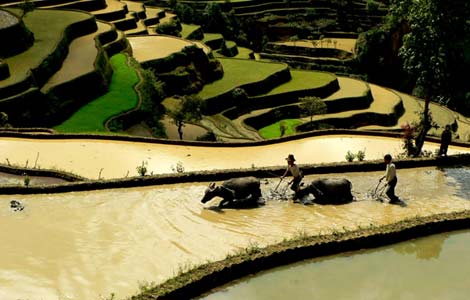Family-friendly project retains dedicated reservoir caretakers
Updated: 2013-06-24 07:13
By Hou Liqiang in Liujiang, Guangxi (China Daily)
|
||||||||
|
Yin Shanyong, a 50-year-old caretaker of the Guantang reservoir in Liujiang county, Guangxi Zhuang autonomous region, cleans monitoring equipment at the reservoir on Sunday. Provided to China Daily |

For four years, Huang Fengqi has guarded one of hundreds of reservoirs across the Guangxi Zhuang autonomous region.
He checks water levels, looks for cracks in the dam and reports any pollution he finds.
At first it was a lonely job, and he admits he came close to quitting. "It used to take me at least 20 minutes to reach the reservoir from my home," he said. "And I often had to make three round trips a day."
What stopped Huang from seeking another job was a policy introduced by Liujiang county that allowed families to guard the area's precious reservoirs together.
"Now, after supper, I go out to inspect the water and the dam with my wife and child," he said. "We chat and keep each other company."
The county used to have a hard time retaining caretakers like Huang. Yet the family model, which has been running since 2010, has been so successful in reducing the high turnover that the authorities now plan to roll it out across the region.
Most reservoirs in Guangxi were built in the 1950s and 1960s. After the flood season from April 1 to Sept 30, water can rise to high levels, which, coupled with even a small crack in a dam, can cause a collapse.
To protect the lives of the thousands of people living below the waters, in 2009 the regional authorities began hiring caretakers to watch over small reservoirs of less than 10 million cubic meters, most of which are in remote locations, and built monitoring stations at larger ones.
"In the first two years (after 2009), we found that many caretakers would quit, mostly because of poor accommodation, as well as the loneliness and boredom of the job," said Li Rongmei, deputy director of Liujiang's water resources bureau. "It was difficult for us to find enough people."
Liujiang launched its family model pilot at 18 of its 39 small reservoirs. Instead of hiring individual caretakers - three during flood season and one during the off-season - the authority looked for families with a child who could live beside the reservoir and monitor the area all year around.
"We pay them the same money as we did to the three or four workers, just now it is all going to one family," Li said. "It works out at 18,000 yuan ($2,940) a year, which is good for a local family."
The government also built two-bedroom homes covering 50 square meters to accommodate the families.
Reservoir caretaker Huang said as well as his regular work, which requires reporting changes in the water level to the town water resources office before 8 am every day and clearing weeds from the embankments, he and his family are also able to take care of more than 100 chickens, a small orchard and almost a hectare of rice and sugar cane.
"The orchard and farm are near the monitoring house," he said. "We can make sure there is someone on duty 24 hours a day so the monitoring work isn't affected."
Yin Shanyong, 50, has been caretaker of Guantang reservoir with his wife and son for three years.
He agreed that having his family close by has changed his work entirely.
"I stay 365 days a year in the monitoring house," he said, "I don't feel lonely at all. Our farm is only half a kilometer away."
Li said the county water resources bureau now plans to spend "one to two years" improving conditions at the monitoring houses and will extend the model to other reservoirs.
houliqiang@chinadaily.com.cn
(China Daily USA 06/24/2013 page7)
Most Viewed
Editor's Picks

|

|

|

|

|

|
Today's Top News
China shares deepen downward spiral
Snowden exposes more US hacking, then flies
Xi vows bigger stride in space exploration
Mandela's condition critical
Suspect in shooting spree detained
Mountaineers killed in Pakistan
Foreign firms eye new 'opening-up'
Project halted due to bird nests
US Weekly

|

|
















